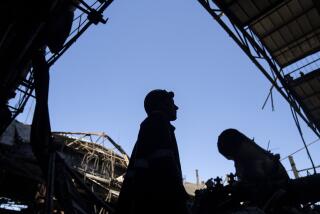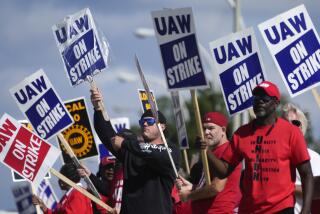Threatened Steel Strike Adds to Gorbachev’s Troubles : Soviet Union: Fearing wage losses, Ukrainian steelworkers start setting up strike committees. Any stoppage could spread to other regions and industries.
- Share via
MOSCOW — Already under fire for the failure of his perestroika reform program to deliver economic dividends, Soviet President Mikhail S. Gorbachev now faces the threat of a potentially crippling steel strike as early as next week, the nation’s media reported Friday.
The immediate threat is in the Ukraine, heart of the country’s steel-making industry, but any strike could quickly spread to other regions and additional industries, according to the reports. The potential damage, both economically and politically, thus rivals that of last summer’s coal strikes, which sent tremors through the power structure that still reverberate today.
At issue are large cutbacks in wages and fringe benefits faced by the workers because of sharp increases in the cost to their employers of electricity, diesel fuel and transportation tariffs. The wholesale price increases were imposed earlier this year as part of the government’s program to rationalize wholesale prices, and the mills are forbidden by decree from passing the boosts on to their customers.
As a result, say the workers, unless the decree is repealed immediately the mills stand to lose millions of rubles. Under prevailing pay practices, that means either direct pay cuts or a sharp reduction in the so-called “social development funds” that pay for employee vacations, housing programs and other benefits.
One mill, the Dnieprospetsstal conglomerate in Zaporozhie, calculates that the average salary of its workers will drop in March from the current 277 rubles a month to 212 rubles, or by about 20%, the government newspaper, Izvestia, reported Friday.
“A wave of discontent has swept smelting plants in the Ukraine,” added Interfax, a news service of Radio Moscow. “The workers are calling for setting up strike committees.”
Interfax reported Friday that the Ukrainian Trade Union Council has requested the republic’s government to either suspend the validity of the wholesale price decree or reduce the share of plant profits earmarked for the national budget in order to compensate for the losses. (The vast majority of Soviet enterprises are state-owned.)
A shop-floor organizer quoted by Izvestia noted that “we have declared a moratorium on strikes for the next five years, and we are still managing to stave off a stoppage. But what about tomorrow?”
The moratorium was meant to give the government a breathing space in which economic reforms would have more opportunity to show results.
But now, said Izvestia, workers have set Monday as the deadline for the government to come up with some acceptable alternative. The newspaper added that representatives from chemical, lumber, agricultural machine-building and other industries also have voiced protests, although they are apparently not as hard hit as the energy-intensive steel industry.
Last summer’s coal strikes so panicked government leaders that they quickly promised to meet virtually all the miners’ demands. Later, they tried to renege on some of those promises, causing another outbreak of strikes in the far north.
The mines are working now, but there are still tensions, and the strikes apparently have earned for the miners an extraordinary voice in national economic affairs.
A large group of miners representing the country’s major coal-producing regions met with Gorbachev and Prime Minister Nikolai I. Ryzhkov on Friday, Soviet television and the official Tass news agency reported.
“Their frank conversation touched upon drastic problems facing perestroika policies, society and the Communist Party,” according to the Tass account of the meeting. “Miners’ representatives shared their ideas and came up with critical suggestions and proposals,” it added.
More to Read
Sign up for Essential California
The most important California stories and recommendations in your inbox every morning.
You may occasionally receive promotional content from the Los Angeles Times.













